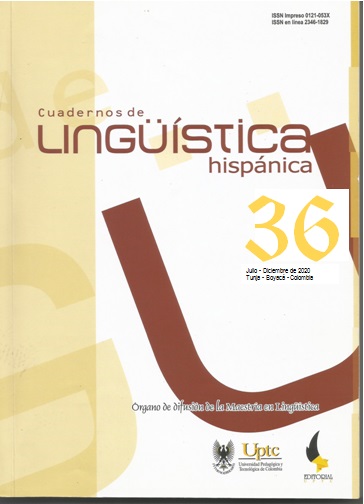Frases nominales predicativas de orientación temporal

Résumé
En este trabajo se plantea que los adjuntos expresados en una frase nominal de orientación temporal tienen una función predicativa. Las construcciones objeto de estudio son del tipo: se negaron a ser trasladados el miércoles. La descripción de estas frases nominales se fundamenta en el hecho de que semánticamente la frase nominal temporal es un predicado eventivo y sintácticamente esta unidad gramatical puede o no ser requerida por el verbo. El aporte de este trabajo se centra, por una parte, en la identificación de un argumento sintáctico y en la caracterización sintáctica y semántica de un adjunto; y por otra, en la justificación del carácter predicativo de los adjuntos. La forma como saturan sus argumentos los verbos y los adjuntos no es de la misma naturaleza sintáctica, pero sí, semántica. Los datos utilizados para ilustrar este hecho de lengua han sido retomados de diferentes fuentes.
Mots-clés
predicación, adjunto, argumento, frase temporal
Références
Alcina, J. & Blecua, J. (1994). Gramática española. Barcelona: Ariel.
Bach, E. (1968). Nouns and noun phrases. En E. Bach & R. Harms (eds.), Universals in linguistics theory (pp. 90-122). Nueva York: Holt, Rinehard.
Bello, A. (1984). Gramática de la lengua española. Madrid: EDAF.
Belloro, V. (2007). Spanish clitics doubling. A study of the syntax-pragmatic interface. (Tesis de doctorado). Universidad Estatal de Nueva York en Búfalo.
Bosque, I. (1989). Las categorías gramaticales. Relaciones y diferencias. Madrid: Síntesis.
Bosque, I. & Demonte, V. (Eds.). (1999). Gramática descriptiva de la lengua española, (vol. 3). Madrid: Espasa.
Bosque, I. & Gutiérrez-Rexach, J. (2009). Fundamentos de sintaxis formal. Madrid: Akal.
Davidson, D. (1967). The logical form of action sentences. In D. Davidson, Essays on actions and events (pp. 105-148). Oxford: Oxford University Press. https://doi.org/10.1093/0199246270.003.0006
Deaño, A. (1978). Introducción a la lógica formal. Madrid: Alianza.
Ibáñez, S. (2012). Argumentos, adjuntos y frases preposicionales en español. En Mairal, R., Guerrero, L. & González, C. (eds.), El funcionalismo en la teoría lingüística: la gramática del papel y la referencia (pp. 187-202). Madrid: Akal.
Jackendoff, R. (1972). Semantic interpretation in generative grammar. Cambridge: MIT Press.
Jespersen, O. (1924). La filosofía de la gramática. Barcelona: Anagrama.
Jolly, J. A. (1993). Preposition assignment in English. In R. D. Jr. Van Valin (ed.), Advance in role and reference grammar (pp. 275-310). Amsterdam-Philadelphia: Benjamins. https://doi.org/10.1075/cilt.82.08jol
Kalish, D. & Montague, R. (1965). Logic. Techniques of formal reasoning. New York: Harcourt Brace.
Kroeger, P. (2008). Analyzing syntax. A lexical-functional approach. Cambridge: Cambridge University Press.
Larson, R. (1985). Bare-NP Adverbs. Linguistic Inquiry, (16), 595-621.
Mora-Bustos, A. (2012). Los adjuntos periféricos. En R. Mairal, L. Guerrero & C. González (eds.), El funcionalismo en la teoría lingüística: la gramática del papel y la referencia (pp. 202-224). Madrid: Akal.
Mora-Bustos, A. (2014). Verbos intransitivos y adjuntos. En P. Butragueño & L. Orozco (eds.), Argumentos cualitativos y cuantitativos en sociolingüística: Segundo coloquio de cambio y variación lingüística (pp. 567-594). México: COLMEX. https://doi.org/10.2307/j.ctv6jmww1.24
Mora-Bustos, A. (2019). Adjuntos obligatorios o de régimen verbal. En N. Palacios (ed.), Voces de la lingüística mexicana contemporánea (pp. 205-234). México: COLMEX. https://doi.org/10.2307/j.ctvsf1pxh.10
Mora-Bustos, A. & García Zúñiga, A. (2018). Modificadores adverbiales. En S. Bogard (ed.), Sentido y gramática en español (pp. 205-233). México: COLMEX.
Real Academia Española –RAE-. (2009). Nueva gramática de la lengua española. Madrid: Espasa.
Smith, C.S. (1991). The parameter of aspect. Dordrecht: Kluwer Academic Publishers. https://doi.org/10.1007/978-94-015-7911-7
Tallerman, M. (2009). Understanding Syntax. London: Hodder Arnold.
Torner Castells, S. (2005). Aspectos de la semántica de los adverbios de modo en español. Barcelona: Unisersitat Pompeu Fabra.
Van Valin, R. (2005). Exploring the syntax and semantic interface. Cambridge: Cambridge University Press. https://doi.org/10.1017/CBO9780511610578
Van Valin, R. & R. LaPolla. (1997). Syntax. Structure, meaning, and function. Cambridge: Cambridge University Press. https://doi.org/10.1017/CBO9781139166799